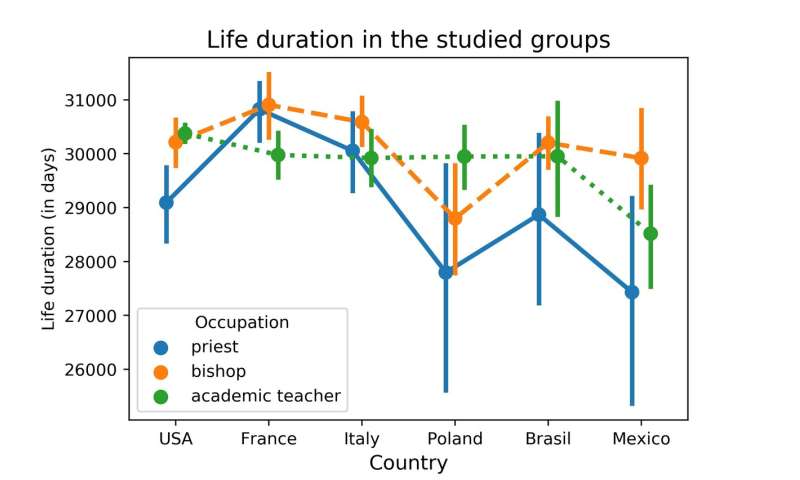Rote intercessory prayer does not increase longevity (probably)

Studying the efficacy of prayer is a sensitive topic: Depending on where you come from, you can either consider it offensive even to try to apply a scientific method to a spiritual process, or you can believe it is a waste of time and a moot effort, as prayers cannot work by definition.
To make matters worse, the existing experimental studies of the effect of intercessory prayer (that is, praying on behalf of others) on health improvement are often prone to the experimenter's bias: It turns out it is actually quite tricky to prepare a research design that would not be later questioned as possibly flawed because of the sampling, the communication of the study's purpose, or even the strong assumptions of the researchers conducting it.
Additionally, most studies of the efficacy of prayer focus on people who already suffer from some medical condition and thus do not allow drawing conclusions about the more long-term effects of prayer on longevity in healthy individuals. If only there were people who are regularly prayed for, ideally by a large group of others.
As it turns out—there are! The Roman Catholic Church has a highly formalized liturgy of every Holy Mass based on the Roman Missal. As a result, during every single mass, a local bishop receives prayers for his well-being.
In our study, we calculated the number of such prayers received by bishops according to the Roman Catholic Church's official mass attendance statistics in six countries. In Mexico, local bishops receive as many as 12 million prayers per capita per annum. In all other countries we studied except France, this number is over 1 million.
In the next step, we calculated the average lifespan of 857 bishops from the studied countries; we included 500 Catholic priests and 3,038 male academics for comparison based on Wikidata bios for notable people. We also compared bishops from the largest and the smallest dioceses.
Interestingly, we found that bishops live longer than priests, but, due to a marginal effect size, this result should be treated with caution. Moreover, there are several good reasons why priests die earlier, including their significantly lower income, social class and worse health care. More importantly, bishops are preselected for longer life when compared to priests, as one can become a bishop only after having served as a priest and having a minimum age of 35 (in practice, much higher on average).
We also found that bishops do not live longer than male academics and also that there was no difference between the mean length of life of bishops from the largest and the smallest dioceses. In short, we have not been able to observe any major effect of hundreds of millions of intercessory rote prayers on longevity.
It should be noted that our study relies on a large dataset, an observational cohort study of people from six countries. As a result, we cannot control for many variables that may affect the outcome. For instance, while wealth and social status for bishops should even further contribute to their longevity, factors such as higher obesity may have an adverse effect on health, and we are unable to account for it. Similarly, vows of celibacy likely decrease longevity for both bishops and priests.
Our study also focuses only on intercessory rote prayer, which is highly ritualized and lacking high intentionality, emotions or a personal relation, not to mention the lack of spatial proximity to the bishop.
However, given the enormous number of prayers per capita received by bishops, if intercessory rote prayer brought even minor longevity benefits, and it was possible to cumulate it, the results should be visible. Also, bishops from larger dioceses should live longer than those from the smaller ones—and they do not.
We hope our study will lead not only to some smiles but also to some reflections, and that we open a new subfield of computational theology.
This story is part of Science X Dialog, where researchers can report findings from their published research articles. Visit this page for information about ScienceX Dialog and how to participate.
More information:
Natalia Banasik-Jemielniak et al. Intercessory Rote Prayer, Life Longevity and the Mortality of Roman Catholic Bishops: An Exploratory Study, Journal of Religion and Health (2021). DOI: 10.1007/s10943-021-01214-9
Dariusz Jemielniak is Full Professor and head of Management in Networked and Digital Environments (MINDS) department, Kozminski University, and faculty associate at Berkman-Klein Center for Internet and Society, Harvard University. He is a corresponding member of the Polish Academy of Sciences. His recent books include Collaborative Society (2020, MIT Press, with A. Przegalinska), Thick Big Data (2020, Oxford University Press), Common Knowlege? An Ethnography of Wikipedia (2014, Stanford University Press). His current research projects include climate change denialism online, anti-vaxxer internet communities, and bot detection.